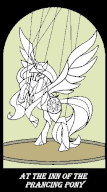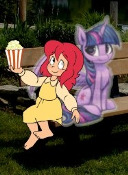Luna's Reviews: Doctor Who: Survival, Part Two--The Master's Really Sort of Rubbish, Isn't He? · 6:08am Sep 16th, 2014
For the first seven years of Doctor Who’s run, it was not felt necessary by executive producers and script editors to give him an arch-enemy. That ended with the introduction of the Master.
It was the era of the Third Doctor. Philip Sandifer, in his Doctor Who analysis site The TARDIS Eruditorium, called the supporting characters in this era “programmatic”. The Brigadier is a character who’s calm and composed despite the fact that panic is usually the more appropriate response to everything that’s happening around him. Jo Grant is plucky and ditzy no matter how many times she’s kidnapped—in fact, thanks to her “degree” in “escapology”, she is a force of nature who is having a grand old time doing whatever she wants despite the world falling apart around her, rather like a certain baker I know.
And the Master, as played by Roger Delgado, is a character who always comes up with ridiculous plots. Like the Brigadier and Jo, the Master has no character development whatsoever. No matter how many times he’s defeated, no matter how ridiculous his last plot was, no matter how many times he has to call the Doctor in to save him when he yet again gets in over his head, he’s always back in the next serial, with yet another doomed scheme to...well sometimes, is it even possible to tell what the objects of his schemes are? Conquer the Doctor’s favorite planet? Subvert a distant empire that the Doctor didn’t really care all that much about before the Master got involved?
McPoodle in one of his stories put a line in a character’s mouth saying that Delgado’s Master is like Discord, that he only wants chaos instead of mastery. I’m not certain that this is the case. But in an era before Nathan-Turner became obsessed with continuity, and before the later eras when character development and continuity were handled well enough for them to be good things instead of drags upon the program, the Master was the most ridiculous of ridiculous characters. It appears that there actually were plans for him, that it would be revealed how closely related he was to the Doctor. (Rabid Fandom: Slash! Executive Producer Letts: No, more like his brother. Rabid Fandom: Incest!) But unfortunately Roger Delgado died in 1973, and the planned episode, the Third Doctor’s regeneration episode, was never made as planned. Perhaps the character of the Master should have died with his actor.
Ace tries to reason with her friends, but they appear more inclined to either panic or give up. She resolves to capture one of the cheetahs. The most enthusiastic of the teens for this plan is a young man named Midge.
The Master with his cat eyes brags to the Doctor and Paterson that he commands the cheetah people, but it appears to be more persuasion than the outright hypnotic control that the Master is known for. The Doctor mounts a horse and takes Paterson with him. They are soon captured by a snare Ace set for the hunters.
The Doctor tells the others that the cheetah planet is falling apart, and explains about the Master.
ACE
Master? Who’s he?DOCTOR
An evil genius. One of my oldest and
deadliest of enemies.ACE
Do you know any nice people? You know,
ordinary people, not power-crazed nutters
trying to take over the galaxy?DOCTOR
I don't think he's trying to take over the
galaxy this time.
The Master was revived as the surprise villain of a well-regarded Fourth Doctor serial—I won’t tell you which one, on the off chance you actually wish to be surprised by his reveal. In that serial, his motivation was survival: he had used up all of his regenerations, and looked like a walking corpse. He appeared to die at the end of that story.
He returned five years later in the serial The Keeper of Traken (1981), near the end of the Fourth Doctor era. There, he was the force corrupting a seemingly perfect society, for no better reason than because it seemed that Traken was incorruptible. Even after seemingly being defeated by the Doctor at the end of the serial, he takes over the body of Tremas, one of the Doctor’s allies. Tremas was played by Anthony Ainley, and so Ainley would portray the Master for the next eight years.
Ainley loved the part of the Master, and put as much of his heart into it as Tom Baker put into the part of the Fourth Doctor at the beginning of his tenure. Unfortunately, the part didn’t love him as much as he loved it. Keeper of Traken was the Master’s best scheme, a force of darkness creating suffering for the pure intellectual challenge of it, and managing to win a significant victory despite the Doctor’s best efforts.
The collapse begins with the next serial, Logopolis. The Master discovers that a society of mathematicians have devised a means to prevent the immanent death of the universe...and halts this rescue in order to hold the entire universe for ransom. As the Doctor remarked in an earlier (Douglas Adams-penned) serial, taking over the universe is a singularly idiotic goal to have, as you can’t exactly tell every single occupant what to do, and since you have nobody to sell the entire universe to, it’s effectively useless as a real estate investment. The serial ends with the incredibly popular Fourth Doctor regenerating into the Fifth Doctor, who will see the beginning of the end of the series...and the loss of half of the entire universe, including Traken. This action was never reversed as far as I could tell.
But these are off-screen deaths, and so sadly are easily disregarded. More front and center is the character of Nyssa, who is now a companion of the Doctor. She was the daughter of the permanently-possessed Tremas, and is now the only survivor of her entire species, nay, her entire quadrant of the universe. In this serial, and this serial alone, she deals with these losses, but for most of her run in Doctor Who, she is the bland would-be scientist that she was originally conceived to be. Like the Master, she is utterly failed by her screenwriters, who are unable or unwilling to write believable characters in a science fiction franchise.
I won’t waste your time with the Master’s subsequent schemes. They were all worse than anything that Delgado had to put up with. By the time of The Five Doctors (1983), his fifth of ten appearances, he was already being treated as a joke by every Doctor he ran into.
The Doctor leads the group of teenagers and one would-be drill instructor quietly past a group of basking cheetahs. Since they are not playing the part of panicking prey, the satiated hunters are uninterested in chasing them. Then the cat brings in a milkman from Earth, and all hell breaks loose. Not only do cheetahs hunt humans, but cheetahs also fight each other for the right to kill those humans. Midge manages to kill one of the cheetahs with a sabre tooth he found in a nearby bone pile, and in triumph he puts on a bone necklace worn by his victim.
Ace pulls a cheetah from its horse in the melee, but later when she sees the cheetah collapse face-first into a lake, she pulls it to safety. The cheetah, named Karra, speaks, expressing admiration for a war-related medal on Ace’s jacket that she got in the earlier serial The Curse of Fenric.
The Master confronts the Doctor, telling him that the planet is psychically linked with the cheetahs. The more they fight with each other and their prey, the more the disintegration of their world accelerates. The world in turn is responsible for the cheetahs: they are not native to this world. Rather, any individuals unfortunate enough to land on the planet and not become prey to them eventually become them. As the Master’s eyes and canine teeth demonstrate, he himself is falling prey to this effect. Conventional escape from the planet is impossible. Only the cheetahs have the power to leave, to teleport themselves to any world they can use to round up prey, which renews the cycle. The Master pointed the cheetahs at Earth, in hopes of eventually snagging the Doctor. He asks his enemy to save them both, before it’s too late.
What we have then is the best possible setting to put the degraded Ainley Master into, where the thing he so desperately needs to master is...himself. And truly, Survival is Ainley’s best performance in the part. 100% ham, of course, but...well, if I were a carnivore, I suppose I could give you a good pun here regarding high-quality pork products.
The Doctor discovers Ace bonding with Karra, and is faced with a difficult choice:
DOCTOR
It [Karra] could be useful to us.ACE
You mean it could help us get home?DOCTOR
They're hunting animals, Ace. We're their
prey. They bring their prey home.ACE
So what?DOCTOR
We need an animal whose home is Earth.
The Seventh Doctor as portrayed by Sylvester McCoy went through two phases in his performance. In his first year, 1987, his companion was the ever-optimistic Mel, and he was a bit of a clown. But starting the next year, his companion was the “troubled teen” Ace, and he was a schemer. Script Editor Cartmel planned a broad character arc for Ace, one of the first ever attempted in Doctor Who. The Doctor would systematically explore Ace’s character flaws, her fears and her irrational hatreds, and force her to confront them. This would culminate in the 1990 season, when Ace would end up enrolling in a Time Lord academy. Of course, the 1990 season was not to be.
With the cancellation, Virgin Books, the company that put out novelizations of Doctor Who serials, obtained the contract to continue the adventures of the Seventh Doctor in book form, thereby giving birth to the Virgin New Adventures. Editor Peter Darvill-Evans decided to take the line in a dark and gritty direction, perfectly in keeping with the trend in science fiction in the late 80’s and early 90’s. Also with the cancellation, the illusion that the series was intended for families was finally jettisoned. The obsessed male teen demographic were the only ones left willing to pay to follow the Doctor’s adventures rather than watch them for the all-program BBC license fee, so the books might as well cater to those preferences.
Accordingly, the Seventh Doctor evolved into the grand chess master, far more manipulative than he ever was on TV. I think he would have gotten along quite well with the unbelievably exaggerated version of my sister that I have encountered in certain stories on this site. Ace, pushed farther than she could stand by the Doctor’s games, became a gun-toting badass. She probably would have sprouted a permanent five-o’clock stubble too if the readers would have let her get away with it. Other companions were brought in for the role of wide-eyed innocent, but eventually all of them ended up broken as well.
Wide-eyed innocence was for losers.
ACE
Where are the others?DOCTOR
I don’t know. We have to find them, and
soon.ACE
It’s weird, Doctor. I think I like this place.
I like it. I feel like I belong here.DOCTOR
Connected.ACE
I’m a bit scared. It feels exciting.DOCTOR
What do you feel?ACE
Like I could run forever. I can smell things
as clear as pictures.DOCTOR
Anything else?ACE
Well, I’m starving, Professor.
Midge attacks one of the more cowardly teenagers, parroting Paterson’s lines to keep him in line. As the others confront him, his eyes suddenly turn feline, and he runs away. The Master, having followed the Doctor long enough to have learned the only way to get back to Earth, catches Midge in a trap, then puts a leather leash on him. The Master taunts the Doctor on what he will have to do to follow them, then he instructs Midge to go home for hunting. The two disappear in a flash. The remaining humans begin to panic, wondering which of them will transform first. Ace sees Karra, and her eyes turn feline. So ends episode two of Survival.





